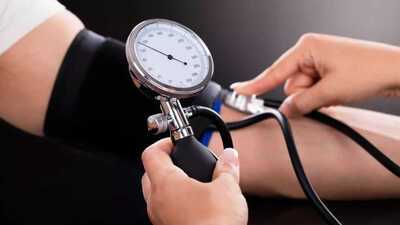Keeping the heart in top shape is crucial for overall health and wellness. Blood pressure plays a vital role in heart health. When it comes to blood pressure, there are many facts women in particular must know. For instance, your blood pressure isn’t one number for life, especially if you’re a woman. Dr. Dmitry Yaranov, a leading heart transplant cardiologist based in Memphis, US, discusses some important facts about blood pressure, every woman must know.
Blood pressure isn’t static throughout life

Normal blood pressure is less than 120/80 mm Hg. If it is at or above 130/80 mm Hg, it is considered high blood pressure or hypertension. However, your blood pressure won’t remain static throughout your life, especially if you are a woman. “Did you know your blood pressure isn't static throughout life? From your 20s to your 60s and beyond, hormonal changes, pregnancy, and menopause can significantly impact your heart health,” the doctor said.
Video
Hypertension arrives earlier than you assume

People often associate hypertension with age. While age is a major influencing factor, it isn’t the only factor. According to the doctor, blood pressure in women starts to rise in their 20s to 30s. “This increases the risk of heart disease earlier than you might expect,” he said, in a video shared on Instagram.
Why blood pressure matters?

Wondering why one should be so concerned about blood pressure? Well, it is a major risk factor for chronic diseases. “High blood pressure is a leading risk factor for heart disease and stroke in women. Regular monitoring and proactive management are crucial for maintaining heart health,” the heart transplant surgeon said. Hypertension is also a silent killer, which means it hardly has any symptoms, and you can only catch it through regular check-ups.
Pregnancy-related risks

The doctor also explains that pregnancy-related conditions may have long-term cardiovascular risks. "Conditions like gestational hypertension and preeclampsia not only affect pregnancy but also elevate long-term cardiovascular risks," he said. Explaining the reason behind high blood pressure post pregnancy, he added, "The decline in estrogen levels leads to stiffer blood vessels, resulting in increased blood pressure and higher risk of hypertension."
Post menopause triples the odds of hypertension

Dr. Yaranavo emphasized that one should be extremely careful about rising blood pressure after menopause. “Post-menopause, women are more likely than men to develop high blood pressure, with a prevalence of 75% in postmenopausal women in the U.S.,” he said. The risk is triple.
He emphasized that rising blood pressure should not be ignored. “These aren’t just numbers. They’re warning signs, and chances to act early,” he cautioned. The doctor also added that monitoring blood pressure regularly is crucial. “Consult with your healthcare provider to understand your risks and manage your heart health effectively,” he said.
Blood pressure isn’t static throughout life

Normal blood pressure is less than 120/80 mm Hg. If it is at or above 130/80 mm Hg, it is considered high blood pressure or hypertension. However, your blood pressure won’t remain static throughout your life, especially if you are a woman. “Did you know your blood pressure isn't static throughout life? From your 20s to your 60s and beyond, hormonal changes, pregnancy, and menopause can significantly impact your heart health,” the doctor said.
Video
Hypertension arrives earlier than you assume

People often associate hypertension with age. While age is a major influencing factor, it isn’t the only factor. According to the doctor, blood pressure in women starts to rise in their 20s to 30s. “This increases the risk of heart disease earlier than you might expect,” he said, in a video shared on Instagram.
Why blood pressure matters?

Wondering why one should be so concerned about blood pressure? Well, it is a major risk factor for chronic diseases. “High blood pressure is a leading risk factor for heart disease and stroke in women. Regular monitoring and proactive management are crucial for maintaining heart health,” the heart transplant surgeon said. Hypertension is also a silent killer, which means it hardly has any symptoms, and you can only catch it through regular check-ups.
Pregnancy-related risks
The doctor also explains that pregnancy-related conditions may have long-term cardiovascular risks. "Conditions like gestational hypertension and preeclampsia not only affect pregnancy but also elevate long-term cardiovascular risks," he said. Explaining the reason behind high blood pressure post pregnancy, he added, "The decline in estrogen levels leads to stiffer blood vessels, resulting in increased blood pressure and higher risk of hypertension."
Post menopause triples the odds of hypertension

Dr. Yaranavo emphasized that one should be extremely careful about rising blood pressure after menopause. “Post-menopause, women are more likely than men to develop high blood pressure, with a prevalence of 75% in postmenopausal women in the U.S.,” he said. The risk is triple.
He emphasized that rising blood pressure should not be ignored. “These aren’t just numbers. They’re warning signs, and chances to act early,” he cautioned. The doctor also added that monitoring blood pressure regularly is crucial. “Consult with your healthcare provider to understand your risks and manage your heart health effectively,” he said.
You may also like

Bihar Cabinet hikes DA from 55 to 58 per cent for its employees, pensioners

Over 18 lakh health camps screened 10 crore citizens under Swasth Nari Sashakt Parivar Abhiyaan: Govt

National Council on the Humanities reshuffled: White House fires majority of members; only Trump appointees remain on board

Indian institutes may see less US offers, new bill targets H-1B exemptions for academia

Health Tips - These 8 foods are best for heart health, learn about them.






